What was supposed to be a small public safety forum hosted by several neighborhood groups Thursday at Montclair Presbyterian Church became a packed town hall with an overflow crowd spilling out onto the sidewalk.
The evening, in a nutshell, was a collision of philosophies about law and order.
Alameda County District Attorney Pamela Price spoke about her reformist approach to justice, which includes a greater emphasis on reducing racial disparities in the criminal legal system, and giving children accused of committing crimes a better chance to turn their lives around, while also supporting victims and charging cases when there’s adequate evidence to secure convictions.
Some residents who attended—not just from Montclair, but also the North Hills, Adams Point, West Oakland, and beyond—pushed back with demands that Price use her office to more aggressively charge suspects, seek lengthier sentences, and lock up juveniles. Many others showed up to support Price, the county’s first Black district attorney.
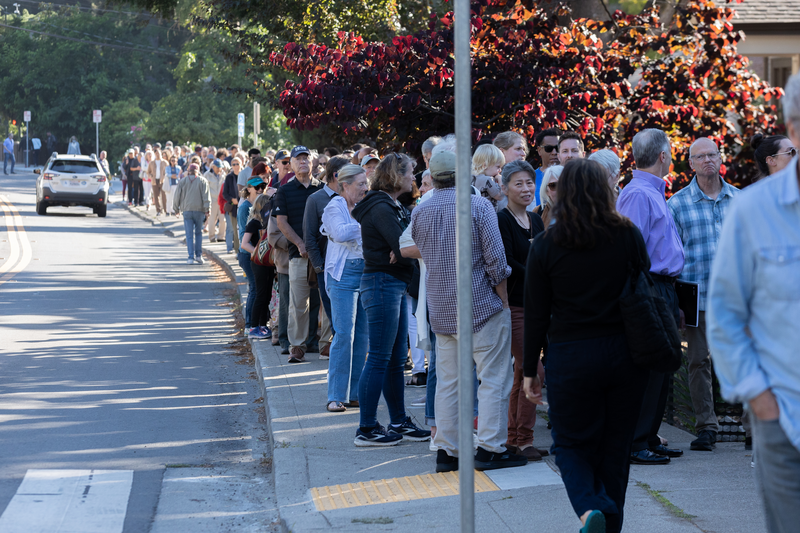
The church’s pastor, Ben Daniel, urged everyone at the start of the meeting to respect each other given the highly polarized atmosphere. “This may not be an easy meeting, but my prayer is that it will be blessed,” Daniel said.
Price began her remarks with a presentation about the inner workings of her administration, saying “there’s a lot of information the public hasn’t always gotten” about how the district attorneys’ office operates. This lack of information, she said, is causing confusion about her role in Oakland’s public safety system, and the tools she has to address concerns about crime.
Price also spoke about the life experiences that have helped to shape her views on the criminal justice system: She had a difficult childhood bouncing between foster homes in Ohio starting at age 13. She was incarcerated for a time and described herself as “a person who is not supposed to be here,” successful and leading a major government office. Her life could just have easily become one derailed by poverty and involvement with the criminal justice system, as it has for a disproportionate number of African Americans. But she credits three of her foster mothers with caring for her and keeping her on track to eventually attend Yale and become an attorney.
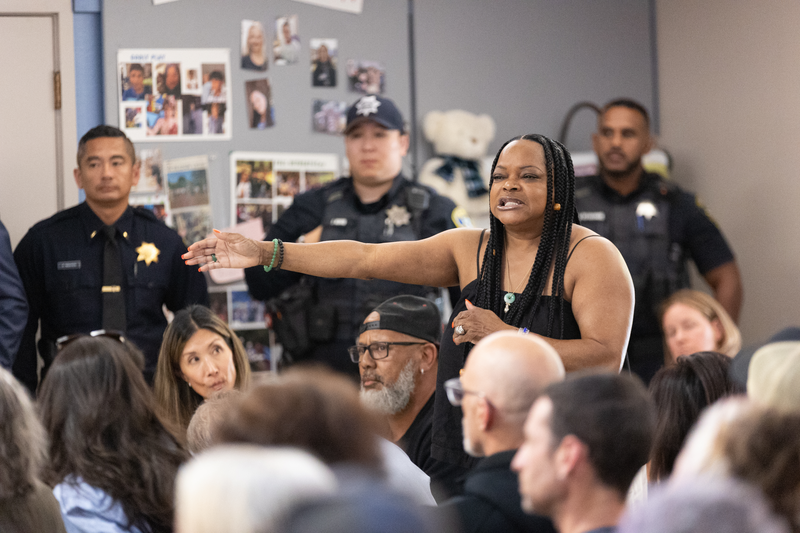
These experiences are what informed her decision to run for office and try to reshape the East Bay’s justice system, she said. “When I looked at our racial disparities for our young people in Alameda County, I could not look away.”
Price swept into office last November on a reform platform that included not charging youth as adults, dropping the use of most types of sentencing enhancements, and more vigorously investigating and prosecuting police when they break the law, among other big changes.
Some attendees interrupted Price as she was presenting. “At what point will you be listening to our safety concerns?” one person asked.
Community concerns about public safety have grown over the past six months, driven in part by a noticeable rise in most categories of crime. Violent crime, including homicides, shootings, and robberies, is up 15% this year, according to OPD. And there have been over 10,000 burglaries this year compared to about 7,000 at this time last year.
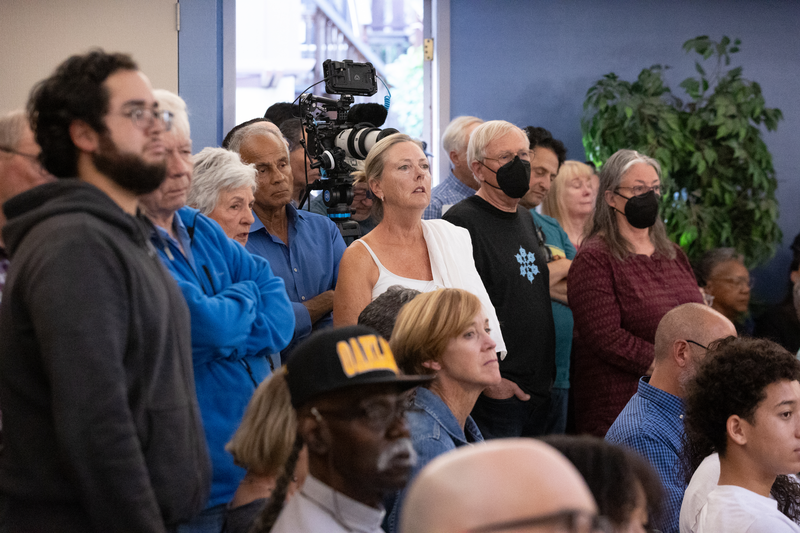
When Price recited a quote by bishop and human rights activist Desmond Tutu to describe her public safety philosophy—“There comes a point where we need to stop just pulling people out of the river. We need to go upstream and find out why they’re falling in”—another person in the audience shouted back, “Consequences!”
This fundamental disagreement—between Price’s belief that systemic change is needed to transform people’s lives so they don’t resort to crime, and the opinion shared by some Oakland residents that authorities need to crack down immediately with stiffer punishments—shaped the night’s discussion.
Carolyn Burgess, a member of the North Hills Community Association, one of the neighborhood groups that organized the meeting, asked Price and Burch to comment on “the elephant in the room,” a series of violent robberies committed by minors earlier this year. The crimes have heightened concern across the city because many of the attacks were against women.
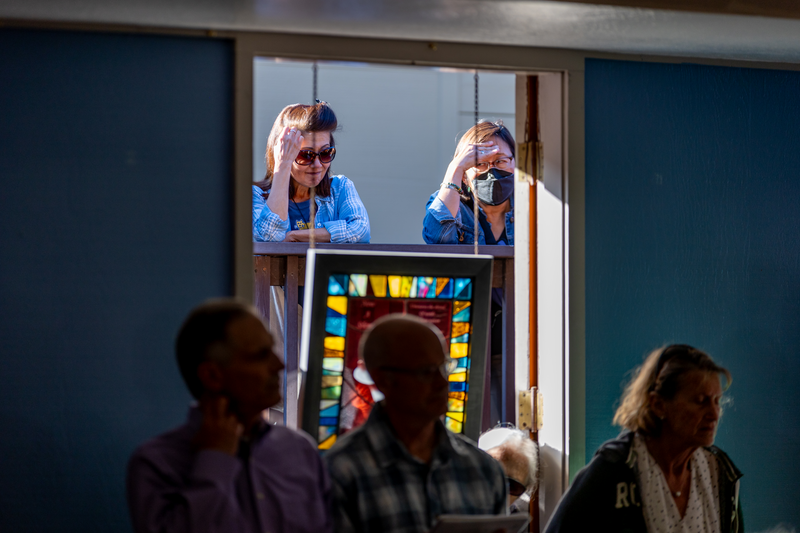
Nine youth, ages 12 to 17, were arrested in May on suspicion of taking part in more than 35 robberies, some that resulted in violent assaults on victims. On Nextdoor, and in other forums, some locals have complained that Price “released” the youngsters without charging them. Some have cited the case as a reason why they’re supporting the recall campaign against Price.
“Like in all other cases, we do everything we can to investigate that case to our fullest and we present that case to the DA’s office,” OPD’s Burch said in response to Burgess’s question about the robberies. “What happens after that obviously is not under our control, but we’re working to collaborate with DA Price on how to make sure that we are presenting the cases in a way that she’s looking for.”
One man in the audience stood up and interrupted Burch to say that Price had been unfairly blamed in the media for the recent increase in robberies, burglaries, and other violent incidents when, in his view, it’s OPD’s job to catch offenders. He pointed at the handful of OPD officers in the room and demanded to know what they were doing to prevent burglaries and robberies. “I know your hands are tied, but you’ve got to do some more preventative stuff,” he said.
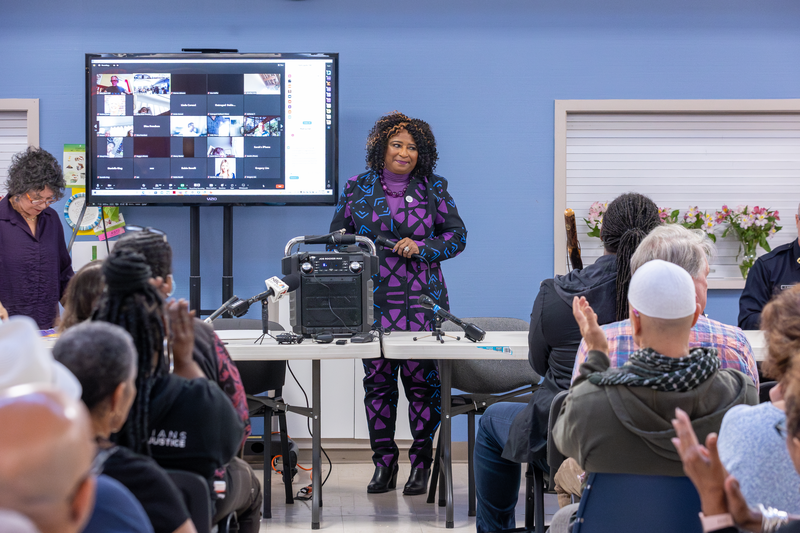
Burch replied that the department’s policies don’t allow officers to carry out vehicle pursuits of burglary suspects, and there are other limitations that make catching thieves extremely difficult, including the low number of officers on patrol at any given time in the city.
On reason for Oakland’s policy discouraging police pursuits is that over the years they have led to numerous collisions, often resulting in bystanders being injured or killed.
To catch burglars, Burch emphasized investigations, which can take weeks or months before a suspect is arrested.
Price said the case involving the nine juvenile suspects has been subject to a lot of “misinformation,” including the allegation that her office “released” the nine children back onto the streets after their arrest. She said it is the Alameda County Probation Department, not the DA, that makes this decision.
“The [probation officer] decides whether or not they’re going to bring that child to juvenile hall, or whether they’re going to release the child to his or her parents,” said Price.
Where her office did play a role was in the decision afterward not to file charges against the children. Price said a “seasoned” deputy district attorney who has worked in the DA’s office for decades reviewed the evidence OPD submitted and concluded they wouldn’t be able to prove beyond a reasonable doubt that any of the individuals committed the robberies.
“My deputy could not determine which of the nine people got out of the car and attacked the victims,” said Price. “The fact is, the video evidence was not sufficient…it was not clear enough to identify them.”
Price said the cases are still under investigation.
Later in the meeting, a woman from the audience told Burch and Price that she’d been carjacked at gunpoint in the Oakland hills last month. “What are we doing to prevent this? How are these people with impunity and brazenness doing this?” she asked. Her comment drew applause from many. According to OPD, there have been 369 car jackings this year, a 10% increase over last year.
Price passed the microphone to Burch, saying the question is one for the police. Burch responded by reading a press release OPD issued a few hours before yesterday’s meeting saying that OPD had arrested three carjacking suspects the day before. The two adults and one juvenile are suspected of being involved in multiple carjackings, according to OPD. Burch said he hopes the arrest and further investigation can assist in figuring out who is responsible for other carjackings.
Throughout the evening, Price returned to the theme of treating young people unlike how they’ve been treated in previous years when arrested on suspicion of a crime. She urged attendees to get more involved in the community through organizations that work directly with Oakland’s at-risk youth.
“I urge you to volunteer with Oakland PAL. Volunteer with the Urban Peace Movement. Volunteer with CURYJ. Volunteer with Youth Alive and Youth Uprising,” she said. “If we want to see young people have a healthy bright future in this community we’ve got to put in the work to help them get there.”

